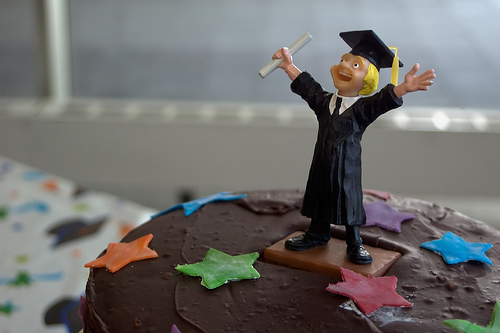 Two nights ago my twin daughters, along with 46 classmates, graduated from their elementary school. The occasion involved a morning service, with breakfast for families, along with an evening program of graduate speeches (in which each kid had their own 45-second speech presented in three languages), handing out of diplomas, dinner and dancing.
Two nights ago my twin daughters, along with 46 classmates, graduated from their elementary school. The occasion involved a morning service, with breakfast for families, along with an evening program of graduate speeches (in which each kid had their own 45-second speech presented in three languages), handing out of diplomas, dinner and dancing.
A full day of celebration, an emotional, full-pack-of-Kleenex affair for a sentimental person like me. Our babies had grown so much and so far, and damned if we weren’t going to mark it properly.
Now I’ve had six graduations of my own over the years, and I can tell you that none were as involved and exhaustively detailed as this ceremony sending 11 and 12-year-olds off to high school.
That being said, there is something particularly momentous about the move from primary to secondary school, especially here in Canada where we don’t have middle schools. In some ways, it is probably a bigger deal than going from high school to college. They are leaving the institution they entered as baby-faced four-year-olds, moving on in awkward new bodies to schools where they will now be the youngest. They may have 12-year-old minds and accumulated good judgment, but some will already look 16. Or even 18.
The range of issues they will contend with will be bigger, with more serious consequences for poor judgment. They will be expected to assume responsibility for their own actions, solve their own problems, make their own important decisions. They will be tempted by new influences, by cigarettes, alcohol, drugs and sexual activities. They will reach the age of medical consent (14 in most cases in Quebec, 16 in most other provinces), and the age of sexual consent (16 across Canada, between 16 and 18 across the U.S.). They will be allowed to drive cars, vote and join the military.
It’s one of the trite sayings of parenthood that little kids have little problems and big kids have big problems. When you have a six-year-old who isn’t yet reading, or a seven-year-old who has no friends, this seems to ignore the gut-wrenching worry parents may experience. But it makes sense, because it takes into account the consequences of these problems: the six-year-old (most of the time) will be seen to by parents, teachers and resource personnel who can make his problem go away, and the seven-year-old will most likely (sometimes with supervision) find her counterpart somewhere in the schoolyard. But the fifteen-year-old who decides to try ecstasy or heroin “just once” may end up in a downward spiral of legal, medical, social and academic problems that can haunt him for a lifetime.
The last unit my daughters’ amazing English teacher, Stacey, taught this group of grade 6’ers before the end of the year was on drug awareness. They read the controversial, classic novel Go Ask Alice, did multimedia presentations on common drugs, had powerful visits from some rehabilitated teenage drug addicts doing community service and, separately, from two wonderful police officers. In her graduation speech to the class and their families last night, she reminded them, as they headed off on the next exciting chapter of their young lives, to ask with each new opportunity, each difficult decision, “Does this fit in with who I am?”
I thought this was brilliant. This simple sentence crystallizes exactly what we want our children to learn. It asks them to listen to that emerging inner voice, the collective wisdom of one’s experiences, advice from parents and teachers. The voice we all have, and sometimes — often to our own detriment — ignore (that second slice of pizza, that third martini, that guy at the party…). It encourages our kids to think about who they want to be, what core values they want to espouse. It evokes the family and communities that help flesh out our identities. It means respecting yourself.
I know plenty of adults who might want to keep this important question handy as they go about their daily lives.
So for all the graduates out there (and parents of graduates), whether moving from middle school to high school, university to grad school or even considering making a leap from an unsatisfying job, consider keeping that question filed away, but close enough at hand for quick reference:”Does this fit in with who I am?”

